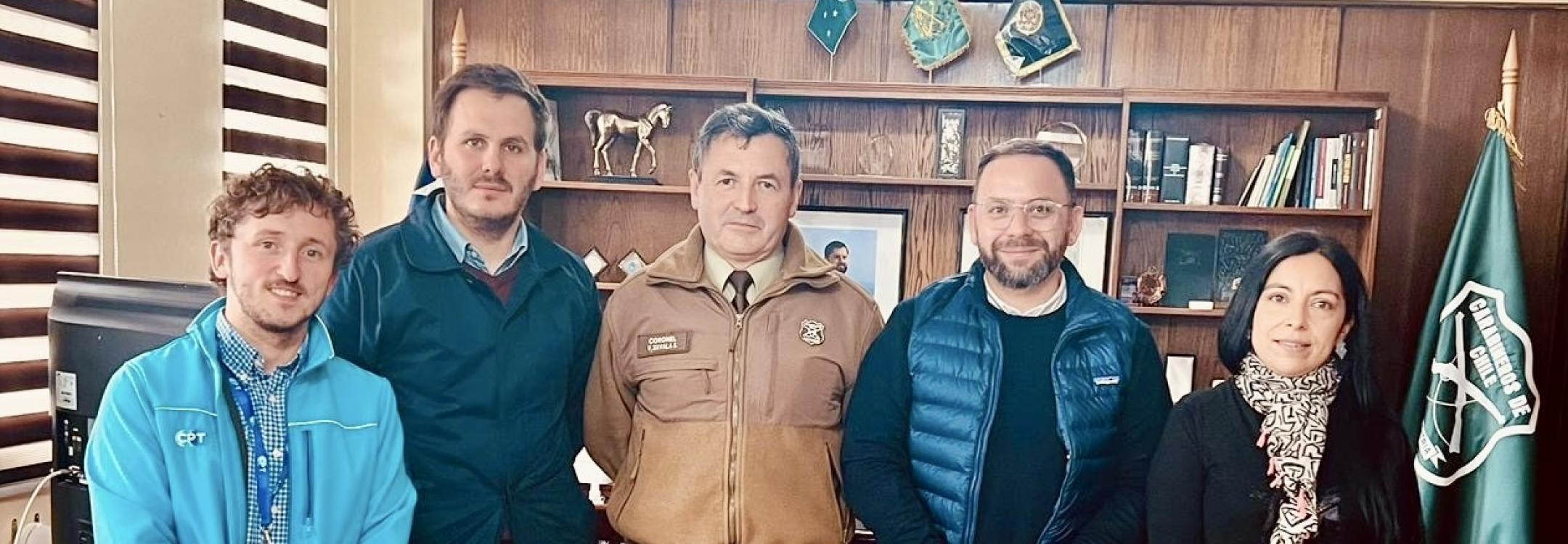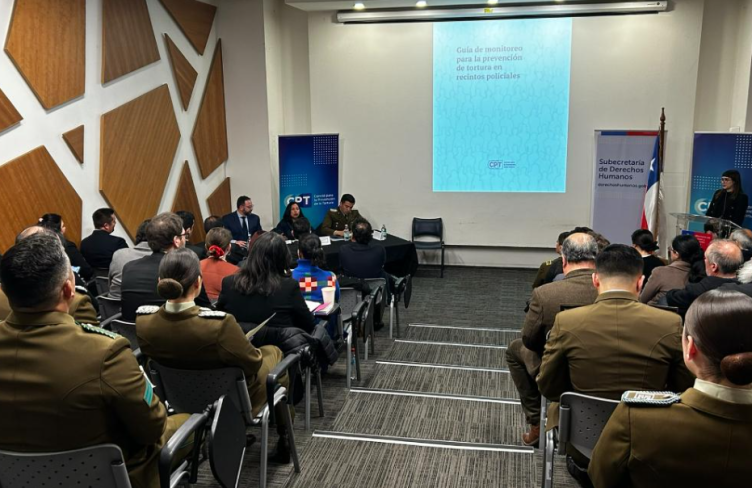
Chile’s Committee for the Prevention of Torture, the country’s national preventive mechanism (NPM), has been operating since 2020. The NPM’s Police Function Team, shares three key lessons for preventing torture in the first hours of detention that have been developed through their monitoring efforts.
Chile, like many countries in the Americas, is grappling with complex issues in relation to public order and security. Across the region, a strong focus has been placed on a justice system that is ‘tough on crime’, excessive use of force by police, and a heavy reliance on weapons and equipment.
In Chile, the response has included the creation of new crimes, an increase in criminal penalties, lowering the age of criminal responsibility, the indiscriminate use of pretrial detention, and the elimination of alternatives to prison.
However, this so-called ‘penal populism’ has not produced the results that had been hoped. On the contrary, it has entrenched many of the problems it sought to address. Most worryingly, it has undermined individual rights to dignity and physical integrity, especially during the first hours of police custody.
Despite this challenging scenario, the monitoring and follow-up work of the NPM demonstrates that it is possible to identify and advocate for changes that support the absolute prohibition of torture and ill-treatment in police custody.
Here are three lessons developed by the NPM’s Police Function Team, informed by their monitoring work.
Lesson 1: Advocate for practical safeguards in detention
We believe it is essential to propose and advocate for practical safeguards in the first hours of detention that go beyond basic legal recognition of the rights of the detainees. Indeed, we have seen the impact that comes from implementing preventive strategies that both protect the physical integrity of detainees, while also making detention procedures more efficient for police.
In more than 80 visits to police units in ten regions of the country,1 we observed, for example, that measures such as the operation of body-worn video cameras by police, including while transporting detained persons, were well received by both police officers and detainees. As police officers told us, this is an important guarantee for all persons involved in the detention process: “On the one hand, by encouraging the officers to act correctly in the management of the custody of persons and, on the other, by allowing the recording to be used as evidence to prove what happened, in the face of allegations of possible mistreatment".
However, we have also been emphatic that adopting body-worn cameras alone is not enough. It is also essential to put in place robust systems for storing the recordings, including establishing policies for registering, managing and accessing data, under the auspice of an independent unit, where it is held for as long as possible.2
Other examples of practical safeguards that have been implemented in different regions of the country, based on the findings and recommendations of our preventive visits, include:
Specialisation of police personnel responsible for the custody of detainees for the management of crisis situations, incorporating competencies in areas such as first aid, de-escalation of conflict situations, anger management techniques, and approaching groups of special protection
- Improving infrastructure and living conditions for detainees in the units visited, both in their cells and in the restrooms.
- Publishing infographics in different languages on the rights of defendants and victims
- Establishing the presence of the Public Defender's Office in the police unit to meet with the detainees,3 along with inter-institutional coordination to speed up the process for verifying injuries
- Implementing digital platforms for communication between police and prosecutors to enable the latter to make prompt and informed decisions.
Lesson 2: More actors, beyond the police, must be involved in preventing torture
We recognise that the police are only one part of a criminal justice system. Although they are traditionally identified as having primary responsibility to guarantee the physical integrity and safety of detained persons, particularly in the first hours of custody, police officers are not the only actors. There are others who, from their different roles within the criminal justice system, are also called upon to guarantee the rights of those accused and exercise an important preventive function.
Reports prepared by the NPM since 2021, as well as the reports of national and international human rights bodies, show that the most risky situations that detainees face no longer occur as frequently in police units, but rather at the time of arrest or during transfers (to the police unit, to health services or when being brought before a judge).4 As such, other actors – such as health personnel, judges, prosecutors, and public and private defenders – can play a critical role in identifying and preventing torture and ill-treatment.
In the case of the Public Defender's Office, we found that, in some parts of the country, the entire context of detention has been transformed into a safer and more respectful environment for the accused. The mere presence of defence attorneys in the police station has a powerful deterrent effect and also allows them to obtain better quality information, which improves the quality of the defence in the first hearings.
We also observed that when the prosecutors coordinated in an efficient manner with the police officers in charge of proceedings, they were able to make quick and quality decisions regarding detainees, thus avoiding uncertainty and reducing overcrowding in police stations.
Further, where the police coordinated with the health authorities so that the initial medical examination was carried out quickly and rigorously, the investigative and protection objectives of this guarantee were met, reducing waiting times in the health services, providing better background information for the criminal investigation, and making it possible to detect instances of abuse by police officers.
We also found that, when the judges at the detention control hearing were committed to ensuring that the intervening parties had complied with their obligations, it was possible to identify illegalities which, despite all preventive efforts, still occurred. This allowed the courts to ensure that such illegalities could be investigated by the appropriate authorities, sending a powerful message to all those involved that torture and ill-treatment is absolutely prohibited.
Lesson 3. Human rights are progressive, we must not turn back
Since the restoration of democracy in 1990, Chile has established a robust human rights framework. This fact - observed by the UN Special Rapporteur on torture during her country visit in October 2023 - is, among other factors, the result of the tireless work of civil society to highlight and defend human rights in the country, the ratification by the State of the core human rights treaties, and the creation of specialised human rights institutions – autonomous and governmental – such as the Ombudsman for Children, the NPM and others.
Unfortunately, experience has shown that these achievements are not necessarily permanent. Several dangers loom large today. The persecution of human rights defenders, attempts to abolish national human rights institutions, and the push to restrict or eliminate their funding, are some of the ways in which these threats are manifested.
One of the most relevant institutional milestones in Chile has been reform of the criminal justice system. Prior to 2000, in Chile and other countries in the region, inquisitorial criminal procedures were still in force. These were secretive hearings, where the magistrate would investigate and judge at the same time. The procedural reform in Chile involved moving to an oral, adversarial, and public system of justice, where the roles of criminal prosecution, defence and trial were differentiated. The incorporation of legal mechanisms to protect victims and defendants was one of the main achievements.
However, two decades on, various changes to the legal system have weakened the protections available to those under investigation. The expansion of police powers to carry out preventive controls, and relaxation of the requirements to decree preventive detention, are just two changes that are unwinding important guarantees in the criminal justice system.
One of the most important tasks for human rights bodies such as ours is to raise awareness among state authorities and officials about the benefits to society of having strong institutions and regulatory systems that promote respect for human rights and the rule of law.
Looking to the future
Four years after the establishment of the NPM, we must unfortunately recognise that torture continues to exist in different places of deprivation of liberty, custody and care in Chile. For this very reason, methodologies for the prevention of state violence are offered as a complementary and innovative alternative.
The changes made by the police and other institutions of the justice system that we have shared here, which so far have been limited to certain parts of the country, reveal that cultural and institutional transformation is possible.
As a result, our thinking for the time ahead includes the creation of a national technical norm that sets the standards for initial medical examinations, a model of legal defense in police units, timely and comprehensive investigations by the Public Prosecutor's Office in cases of torture and ill-treatment, and internal control systems by the police. These are just some of the structural transformations that can reduce the risk factors that lead to torture and ill-treatment in the first hours of police custody.
For this to happen, the NPM will spare no effort to ensure that what has so far been the exception will become the norm. Our goal is to contribute to strengthening public institutions and, as a result, strengthening democracy and the rule of law.
The CPT's Police Function Area is made up of expert Sebastián Cabezas Chamorro and professional analysts María Cecilia Jaramillo Minchel and Alfredo Fernández Ureta.
____________________________________________________________________________________
[1] Reports describing these visits are available at: https://mnpt.cl/funcion-policial-2/.
[2] https://mnpt.cl/wp-content/uploads/2023/11/Variable-Sistema-de-Videovigilancia-en-Unidades-Policiales.pdf
[3] APT, https://www.apt.ch/es/node/3066 .
[4] https://bibliotecadigital.indh.cl/items/a108924a-6319-4156-91bc-37ca416357b7 also in the chapter of the Annual Report of the National Institute of Human Rights 2023 on Public Order and Policing available at: https://bibliotecadigital.indh.cl/server/api/core/bitstreams/4be2cd31-88e5-4c09-b781-62f4871a9978/content.




